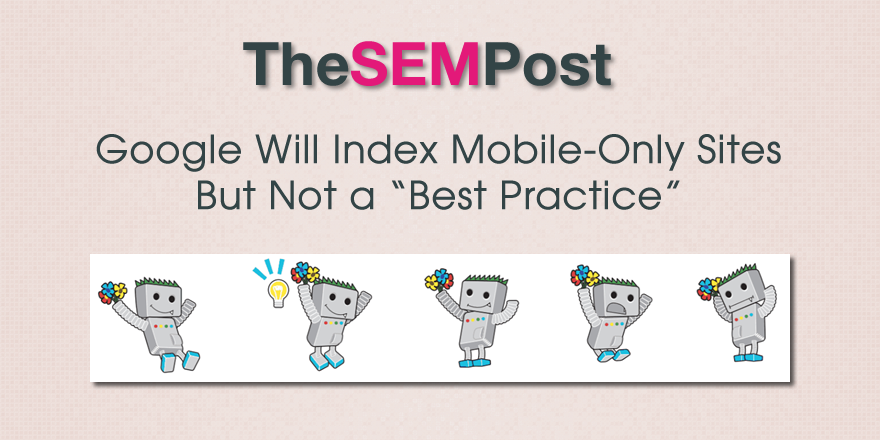 In the most recent Google Webmaster Office Hours Hangout, the question came up about mobile only websites and whether it is possible for Google to successfully index websites that are designed for mobile only, and without an equivalent desktop version. The answer is yes… however, just because Google says it can do it, doesn’t mean it should be considered a best practice.
In the most recent Google Webmaster Office Hours Hangout, the question came up about mobile only websites and whether it is possible for Google to successfully index websites that are designed for mobile only, and without an equivalent desktop version. The answer is yes… however, just because Google says it can do it, doesn’t mean it should be considered a best practice.
First, Google indexes a desktop version of a website and uses that for ranking both the desktop and the mobile version in the Google search results. But when Google only has a mobile version to crawl, without a desktop version available, Google will index that mobile version in lieu of anything else, since it is better than indexing nothing.
First here is what Mueller says in the Google Office Hours:
So you can have a mobile site that’s just mobile. That’s perfectly fine, that’s not something where you need to have a desktop version for any website. You can have a website that is only mobile, it will still work on desktop browsers of course, maybe the display will look a little bit different but you can have a mobile only website and use that, that’s perfectly fine, we can do that in search just like anything else.
What I would try to make sure there is that it still works on desktop, that it doesn’t show an error on desktop, but rather that someone on a desktop can still access it because what will generally happen is we’ll just include the mobile site in our search results like any other site and we’ll also present it to desktop users.
So just make sure that desktop users can still see some of your content, if it is formatted in a way that works best for mobile, that’s perfectly fine. You definitely don’t need a specific desktop website in addition to a mobile site.
However, John Mueller clarifies the comments he made in the hangout on Google+ to say that just because Google can index a mobile-only website doesn’t mean it should be considered “best practice” to do so nor should it be the recommended setup for Google indexing purposes.
I’d just like to clarify that just because you can do something, doesn’t mean you should, nor that it’s a best practice :-). If all we have from a business is a mobile-friendly site, then we’d rather index that than nothing. That obviously doesn’t make it a great practice though. A good way to make it work in both worlds would be to have a site that uses responsive web-design techniques to adjust to the size of the user’s device / settings.
There are a few sites that I have come across that only seem to offer a mobile-only version and can be quite awkward to navigate with such a small screen dedicated to the site while viewing it from a desktop computer with a large monitor… or worse, a site that can only really be used by downloading and using a mobile app. But websites with a mobile-only design can alienate those who prefer to visit a site on desktop first – or even tablet – before downloading the app or visiting the site on mobile. This would be especially true for users who might have problems reading a lot of smaller text on a mobile site.
Mueller says that while he can imagine a site may start with a mobile-only version, he does recommend sites also “provide an awesome experience for users with larger screens,” including desktops, laptops, and even television.
Bottom line, yes Google can and will index a site that only has a mobile version of the site. But just because Google can do it, doesn’t make it a best practice or even a recommended way to do it.
Jennifer Slegg
Latest posts by Jennifer Slegg (see all)
- 2022 Update for Google Quality Rater Guidelines – Big YMYL Updates - August 1, 2022
- Google Quality Rater Guidelines: The Low Quality 2021 Update - October 19, 2021
- Rethinking Affiliate Sites With Google’s Product Review Update - April 23, 2021
- New Google Quality Rater Guidelines, Update Adds Emphasis on Needs Met - October 16, 2020
- Google Updates Experiment Statistics for Quality Raters - October 6, 2020